

Communication, the social matrix of psychiatry : Ruesch, Jurgen. International Education News l The PIE News l George Siemens, University of Texas Arlington. GS: I have two positions – at the University of Texas Arlington I’m Executive Director and Professor for the Learning Innovation and Networked Knowledge research lab, and I’m also cross-appointed with Athabasca University at the Center for Distance Education as a faculty member.
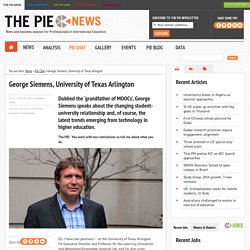
Right now I’m looking at a range of factors on the impact of technology on really any aspect of the university experience, so the opportunities to use learning analytics is part of that; the opportunity to rethink university structures, teaching practices, pedagogy and so on. “The digitisation of learning is what enabled us to talk about MOOCS. Learning and Connectivism in MOOCs. Roots of Connectivism. Welcome to CCK11 ~ CCK11. Connectivism & connective knowledge - Google Scholar. Lisbon Connectivism. Roots of Connectivism. Connectivism. Broadcast Yourself. Connectivism: Bearing a Heavy Node. Published by Convergence Academies, I recently came across this infographic on learning theory on the most excellent blog, TeachThought.
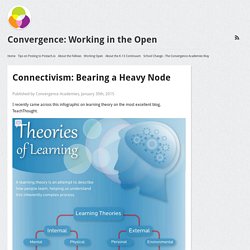
Connectivism: Its place in theory-informed research and innovation in technology-enabled learning. Special Issue - Connectivism: Design and Delivery of Social Networked Learning Frances Bell University of Salford, United Kingdom Abstract The sociotechnical context for learning and education is dynamic and makes great demands on those trying to seize the opportunities presented by emerging technologies.
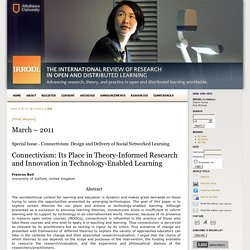
The goal of this paper is to explore certain theories for our plans and actions in technology-enabled learning. Reclaiming Personal Learning. Constructivism and Eliminative Materialism. A few months ago Fred M Beshears and I discussed Constructivism and Materialism.
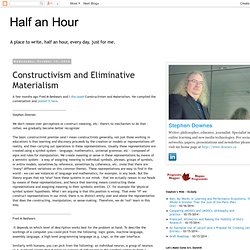
He compiled the conversation and posted it here. -------------------------------------------- Stephen Downes We don't reason over perceptions or construct meaning, etc- there's no mechanism to do that - rather, we gradually become better recognizer The basic constructivist premise (and I mean constructivists generally, not just those working in education) is that learning and discovery proceeds by the creation or models or representations off reality, and then carrying out operations in these representations. Usually these representations are created using a symbol system - language, mathematics, universal grammar, etc - composed of signs and rules for manipulation. ------------------------------------------------ Fred M Beshears It depends on which level of description works best for the problem at hand. 'Connectivism': Creating Learning Communities.
In the field of online sharing and learning, the “Massive Open Online Course” (“MOOC”) has received a lot of attention.
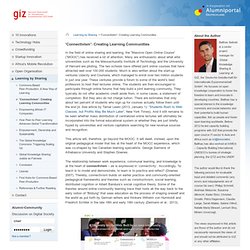
Many are enthusiastic about what elite universities such as the Massachusetts Institute of Technology and the University of Harvard are piloting. The two schools have offered joint online courses that have attracted well over 100,000 students. Much is also written about the start-up ventures Udacity and Coursera, which managed to enroll over two million students in just one year. Learning and Connectivism in MOOCs. Learning and Connectivism in MOOCs. Beyond Institutions Personal Learning in a Networked World. KnowingKnowledge_LowRes.pdf. Connectivism a New Learning Theory.
Harvardx talk. Connectivism: Informing Distance Education Theory, Pedagogy and Research. (Critical Review) George Siemens’ (2005) article “Connectivism: A Learning Theory for the Digital Age” has sparked both innovation and controversy (Anderson, 2009; Kop & Hill, 2008; Bell, 2001).
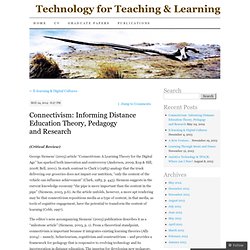
In stark contrast to Clark’s (1983) analogy that the truck delivering our groceries does not impact our nutrition, “only the content of the vehicle can influence achievement” (Clark, 1983, p. 445), Siemens suggests in the current knowledge economy “the pipe is more important than the content in the pipe” (Siemens, 2005, p.6). ~ Stephen's Web. Connectivism, as I describe it, suggests that there are different types of knowing networks.
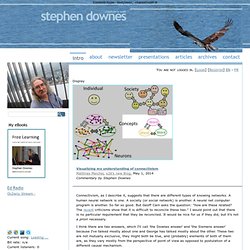
A human neural network is one. A society (or social network) is another. A neural net computer program is another. So far so good. But Geoff Cain asks the question: "how are these related? I think there are two answers, which I'll call 'the Downes answer' and 'the Siemens answer' because I've talked mostly about one and George has talked mostly about the other. The Siemens answer is multimodal extension. The Downes answer is pattern recognition (yes yes I know William Gibson wrote a book of that name, and that the concept is widely discussed by others).
Why Connectivism is a Learning Theory. David Wiley recently made a comment on his blog, in response to a very succinct posting by Stephen Downes, that the learning theory Connectivism, though he is sympathetic to it, was incomplete.
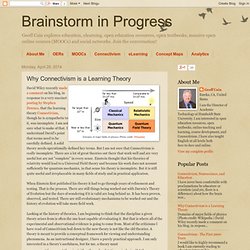
I am not sure what to make of that. I understand David's point that terms need to be carefully defined. An interview with Canadian MOOC pioneer George Siemens. George Siemens, Canada’s MOOC pioneer, opens up about where the movement is headed. by Rosanna Tamburri In 2011, renowned Stanford University professor and Google executive Sebastian Thrun launched his now famous, free online course on artificial intelligence, attracting a whopping 160,000 students worldwide and vaulting higher education onto the front pages of major international newspapers.
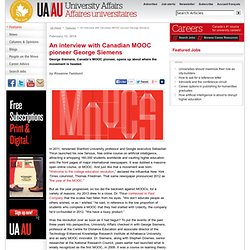
It was dubbed a massive open online course, or MOOC. And just like that a movement was born. “Welcome to the college education revolution,” declared the influential New York Times columnist, Thomas Friedman. But as the year progressed, so too did the backlash against MOOCs, for a variety of reasons. Was the revolution over as soon as it had begun? Dr.
University Affairs: When we spoke a year or so ago the MOOCs phenomenon was just starting to snowball. Dr. University Affairs: Dr. Dr. Dr. University Affairs: Since Dr. Dr. Konnektivismus – die Lerntheorie für das Lernen in medialen Welten? ← Nils Friedel. Wer sich mit dem weiten Feld von eEducation auseinandersetzt, der stößt immer wieder auf den Konnektivismus.
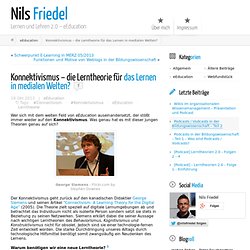
Lesetipp: Konnektivismus – (k)eine Lerntheorie? Konnektivismus ist eine Haltung. Wann ist ein MOOC ein MOOC? Diese Frage wurde im #mmc13 ausführlich diskutiert und ist heute nachmittag auf Twitter nochmal aufgeflammt. Leider musste ich irgendwann aussteigen, weil ich unterwegs und in Terminen nicht mehr online sein konnte. Gregory Bateson Quotes. (1) International Bateson Institute. Theorie Bateson/Siemens basiert.